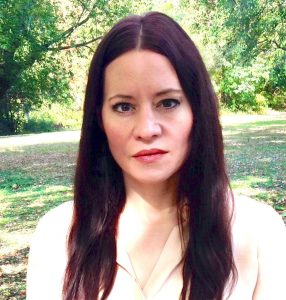Jennifer Gosetti-Ferencei
 JENNIFER GOSETTI-FERENCEI, Ph.D., is Professor and Kurrelmeyer Chair in German at Johns Hopkins and holds a secondary appointment as Professor in Philosophy. Her research interests include Continental philosophy, particularly phenomenology, aesthetics and the philosophy of literature, cognitive literary theory, poetics, philosophy of imagination, and modernism, especially modern German literature. She has previously taught for modern languages departments in the UK (Oxford and Birmingham, at the latter of which she was Chair and Professor of German and Comparative Literature) and was for a number of years Professor of Philosophy at Fordham University, where she twice served as Director of Graduate Studies. She received the D.Phil. in German and M.St. in European Literature from Oxford; M.A. and Ph.D. in Philosophy from Villanova; and an M.F.A. in Poetry from Columbia University.Gosetti-Ferencei’s research has included monographs on the philosophy of imagination, the construction of the exotic in German modernism, the relationship between the quotidian or everyday experience and ecstatic reflection in phenomenology, modern art and literature, and a critical reading of poetics in Heidegger and Hölderlin. Her work frequently explores the boundaries between philosophy and literature, poetic experience and cognition, and in addition to Hölderlin her work has engaged the writings of Rainer Maria Rilke, Wallace Stevens, Marcel Proust, Franz Kafka, Thomas Mann, and many other modernist writers. Her work in aesthetics has engaged the visual art of Paul Cézanne, Cy Twombly, Giorgio Morandi, Alfred Kubin, Georg Baselitz and Anselm Kiefer. Her book of poetry, After the Palace Burns, won The Paris Review Prize.
JENNIFER GOSETTI-FERENCEI, Ph.D., is Professor and Kurrelmeyer Chair in German at Johns Hopkins and holds a secondary appointment as Professor in Philosophy. Her research interests include Continental philosophy, particularly phenomenology, aesthetics and the philosophy of literature, cognitive literary theory, poetics, philosophy of imagination, and modernism, especially modern German literature. She has previously taught for modern languages departments in the UK (Oxford and Birmingham, at the latter of which she was Chair and Professor of German and Comparative Literature) and was for a number of years Professor of Philosophy at Fordham University, where she twice served as Director of Graduate Studies. She received the D.Phil. in German and M.St. in European Literature from Oxford; M.A. and Ph.D. in Philosophy from Villanova; and an M.F.A. in Poetry from Columbia University.Gosetti-Ferencei’s research has included monographs on the philosophy of imagination, the construction of the exotic in German modernism, the relationship between the quotidian or everyday experience and ecstatic reflection in phenomenology, modern art and literature, and a critical reading of poetics in Heidegger and Hölderlin. Her work frequently explores the boundaries between philosophy and literature, poetic experience and cognition, and in addition to Hölderlin her work has engaged the writings of Rainer Maria Rilke, Wallace Stevens, Marcel Proust, Franz Kafka, Thomas Mann, and many other modernist writers. Her work in aesthetics has engaged the visual art of Paul Cézanne, Cy Twombly, Giorgio Morandi, Alfred Kubin, Georg Baselitz and Anselm Kiefer. Her book of poetry, After the Palace Burns, won The Paris Review Prize.
Gosetti-Ferencei’s most recent book, The Life of Imagination: Revealing and Making the World (Columbia University Press, 2018), is grounded in research in philosophy and a range of other disciplines, including cognitive theory, evolutionary anthropology, aesthetics and literary theory, and offers a new theory of imagination as both grounded in the wider cognitive ecology of our embodied life and engagement with the world, and affording its transformation and transcendence. In contrast to a long tradition of philosophy that sequestered imagination from cognition proper, Gosetti-Ferencei demonstrates how imagination must be understood as multifaceted, shaping our ordinary experience as well as the heightened manifestations of creativity, such as in scientific discovery and artistic and literary creation. Among other accomplishments of the book is the development of an understanding of cognitive play (drawing from Kant, Schiller, Nietzsche, and Husserl), which shows how creativity affords ‘situated transcendence’ and in so doing both relies upon, and diverges from, the operations of ordinary thinking.
Previous works include Exotic Spaces in German Modernism (Oxford University Press 2011), in which Gosetti-Ferencei illuminates the construction of the ‘exotic’ in modern German literature. The rendering of exotic spaces, or spaces projected as such, is shown to enable forms of examination of the modern self and its relation to a foreign other, sometimes exploiting, otherwise destabilizing, colonialist or Eurocentric assumptions. She engages prose works of Hofmannsthal, Dauthendey, Hesse, Benn, Brecht, Kubin, Zweig, Kafka, and Thomas Mann, also mining the 19th century speculations of Nietzsche and other German philosophers as the theoretical foundation for modern literary challenges to the self and European modernity.
Reflection on the quotidian, or the everyday, in literature, art, and phenomenology comprises the subject of The Ecstatic Quotidian: Phenomenological Sightings in Modern Art and Literature (Pennsylvania State University Press 2007). Gosetti-Ferencei there demonstrates analogous structures of reflection in phenomenology, modern literature and visual art, in their respective defamiliarizations from everyday experiences, and engages the ideas of Nietzsche, Freud, Heidegger, Benjamin, Merleau-Ponty and Wittgenstein in conceiving the relation between the everyday and the ecstatic.
In her book Heidegger, Hölderlin, and the Subject of Poetic Language (Fordham University Press 2004), Gosetti-Ferencei reconstructs Hölderlin’s fragmentary poetic theory, and his theoretical and poetic responses to the ideas of Kant, Fichte and Schiller, in order to critically address Heidegger’s interpretations of the poet and their political entanglements. She demonstrates that Hölderlin’s poetics, while inspired by Enlightenment ideals, supports a theory of poetic subjectivity both tragic and analeptic in nature, a model which at once structures a reverent human relationship with nature and evades the problematic ontology of Heidegger’s notion of the history of Being.
Gosetti-Ferencei’s current projects include monographs on existentialism, an introduction to philosophy of imagination, and on nature and ecology in modern literary thought, including in Hölderlin, Nietzsche, Kafka and Rilke.